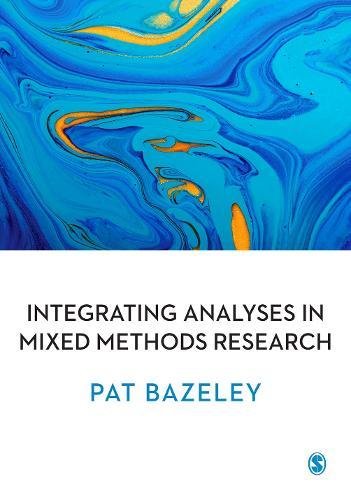图书简介
Integrating Analyses for Mixed Methods Research goes beyond mixed methods research design and data collection, providing a pragmatic discussion of the challenges of effectively integrating data to facilitate a more comprehensive and rigorous level of analysis. Showcasing a range of strategies for integrating different sources and forms of data as well as different approaches in analysis, it helps you plan, conduct, and disseminate complex analyses with confidence. Key techniques include: Building an integrative framework Analysing sequential, complementary and comparative data Identifying patterns and contrasts in linked data Categorizing, counting, and blending mixed data Managing dissonance and divergence Transforming analysis into warranted assertions With clear steps that can be tailored to any project, this book is perfect for students and researchers undertaking their own mixed methods research.
Part One: A foundation for integrated analysis \\ Chapter 1: Mixed methods in context \\ Why mixed methods? \\ The emergence of a mixed methods movement \\ Defining the mixed methods territory \\ The challenge of integration \\ What does mixing contribute? \\ Philosophical foundations for integration in mixed methods analysis \\ Chapter 2: Planning for analysis \\ Approaches to design for mixed methods research \\ Designing for analysis \\ Visualising design elements \\ Using software for analysis \\ Skills and teamwork in mixed methods research \\ Chapter 3: Interpreting data \\ The task of data analysis \\ An interpretive orientation to data and analysis \\ Interpreting statistical and non-numeric data sources – some cautionary notes \\ A framework for mixed methods analysis \\ A process-oriented logic model for integrated analysis \\ Part Two: Integrative analysis strategies \\ Chapter 4: Sequential integration: analysis guiding design and further analysis \\ Developmentally inform design \\ Elaborate and extend understanding \\ Sequential confirmation, generalisation, or validation \\ Typology development to inform analysis \\ Iterative cross-fertilisation between methods \\ Using software in sequential and iterative studies \\ Writing sequential methods \\ Chapter 5: Complementary analysis of varied data sources \\ Enhance analysis (and reporting) with supplementary data \\ Compose a coherent picture from complementary data \\ Juxtapose complementary sources \\ Exploring process and outcome: integrating complementary sources in analysing the effectiveness of interventions \\ Complementary analyses: a caution and a final example \\ Chapter 6: Analysing linked data: seeking patterns and contrasts \\ Cases as units of analysis when linking data \\ Preliminary processing of data sources \\ Strategies for analysing linked data sources \\ Missing data in linked data sources \\ Integration of linked data: a final example \\ Chapter 7: From codes and counts to content analysis and ’big data’ \\ Counts from qualitative data \\ Content analysis – quantitative or mixed method? \\ ‘Big data’ – a scientific revolution in the making? \\ Counting, content analysis and big data in the context of integrated mixed methods analyses \\ Chapter 8: Integration through data transformation 1: Qualitative data to statistical variables \\ Quantifying qualitative data for further analysis – theoretical aspects \\ Statistical analysis options for a “qualitative” case by variable matrix \\ Chapter 9: Integration through data transformation 2: Exploratory, blended, and narrative approaches \\ Transforming qualitative data for exploratory multivariate analyses \\ Exploratory multivariate statistical analyses for case and matrix data \\ Building descriptive and narrative accounts from numeric data \\ Blended analyses and consolidated databases: coding, conversion, and combination working together \\ Chapter 10: Inherently mixed, hybrid methods \\ Inherently mixed strategies \\ Hybrid strategies \\ Chapter 11; Exploring dissonance and divergence \\ Dissonance and its resolution in mixed methods studies \\ Learning from the analysis of divergent or extreme cases \\ Part 3: Negotiated, warranted inferences \\ Chapter 12: From integrative analyses to warranted assertions and a coherent, negotiated account \\ The negotiation starts \\ Progressing the conversation \\ Negotiating coherence through writing and visualising \\ Ensuring the warrant for mixed methods inferences \\ Warranted assertions
Trade Policy 买家须知
- 关于产品:
- ● 正版保障:本网站隶属于中国国际图书贸易集团公司,确保所有图书都是100%正版。
- ● 环保纸张:进口图书大多使用的都是环保轻型张,颜色偏黄,重量比较轻。
- ● 毛边版:即书翻页的地方,故意做成了参差不齐的样子,一般为精装版,更具收藏价值。
关于退换货:- 由于预订产品的特殊性,采购订单正式发订后,买方不得无故取消全部或部分产品的订购。
- 由于进口图书的特殊性,发生以下情况的,请直接拒收货物,由快递返回:
- ● 外包装破损/发错货/少发货/图书外观破损/图书配件不全(例如:光盘等)
并请在工作日通过电话400-008-1110联系我们。
- 签收后,如发生以下情况,请在签收后的5个工作日内联系客服办理退换货:
- ● 缺页/错页/错印/脱线
关于发货时间:- 一般情况下:
- ●【现货】 下单后48小时内由北京(库房)发出快递。
- ●【预订】【预售】下单后国外发货,到货时间预计5-8周左右,店铺默认中通快递,如需顺丰快递邮费到付。
- ● 需要开具发票的客户,发货时间可能在上述基础上再延后1-2个工作日(紧急发票需求,请联系010-68433105/3213);
- ● 如遇其他特殊原因,对发货时间有影响的,我们会第一时间在网站公告,敬请留意。
关于到货时间:- 由于进口图书入境入库后,都是委托第三方快递发货,所以我们只能保证在规定时间内发出,但无法为您保证确切的到货时间。
- ● 主要城市一般2-4天
- ● 偏远地区一般4-7天
关于接听咨询电话的时间:- 010-68433105/3213正常接听咨询电话的时间为:周一至周五上午8:30~下午5:00,周六、日及法定节假日休息,将无法接听来电,敬请谅解。
- 其它时间您也可以通过邮件联系我们:customer@readgo.cn,工作日会优先处理。
关于快递:- ● 已付款订单:主要由中通、宅急送负责派送,订单进度查询请拨打010-68433105/3213。
本书暂无推荐
本书暂无推荐












